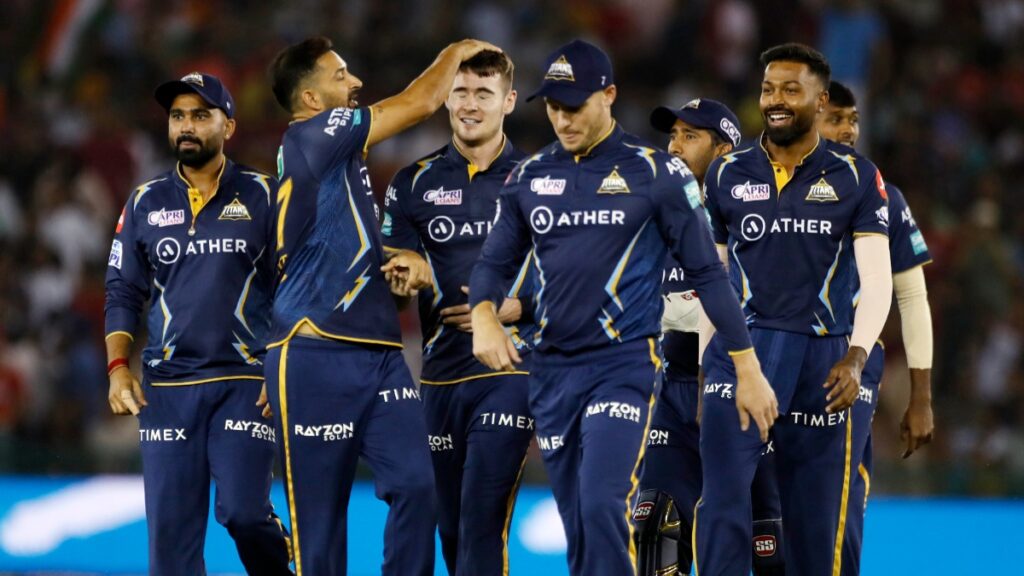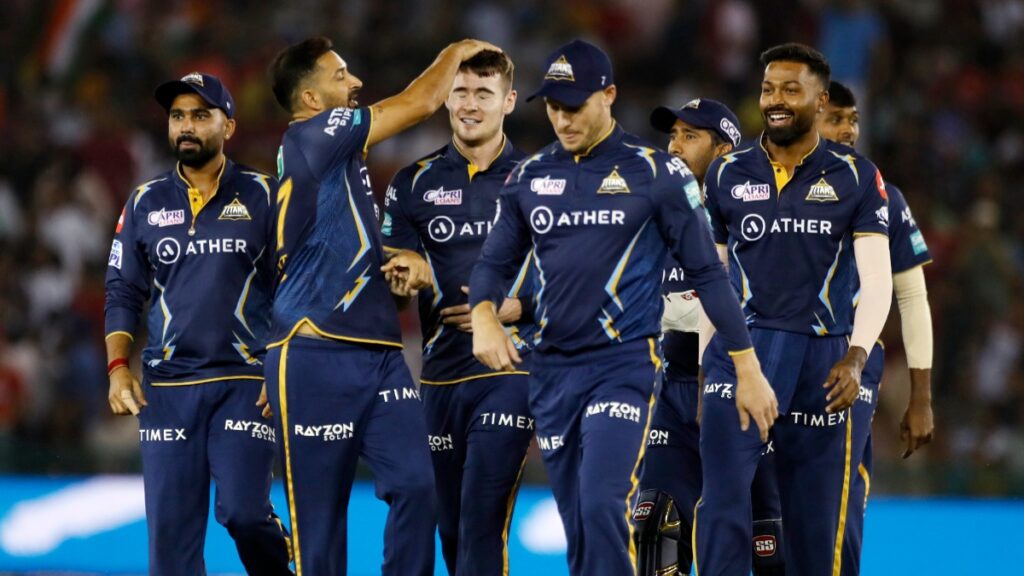
Shivam Dube, whose exhilarating six-hitting had been such a big part of the Chennai Super Kings’ Indian Premier League (IPL) 2023 campaign, couldn’t even get the first ball off the square. The second, again unerringly directed at the blockhole, was just about squeezed down the ground for a single. Ravindra Jadeja on strike. Same outcome, a single down the ground off a low full toss. Dube can do little with the fourth ball either. As the white orb is gathered by the long-off fielder and thrown in, the game seems as good as over.
Mohit Sharma, the revelation of this IPL with his canny death bowling, has been near-flawless. Chennai need 10 from two balls. The spotlight is squarely on Jadeja, on five from four balls. Dube, the man who had been clearing the rope with ease, is merely a helpless spectator.
Having been behind the eight-ball for most of Chennai’s run chase, Gujarat Titans, the defending champions, can suddenly glimpse the finish line. The team that has made a habit of winning close matches across their two seasons in the league appears to be on the verge of closing out another.
And then they pause. Jayant Yadav comes on to the field with some electrolytes and a message for Mohit, and Hardik Pandya. Maybe Ashish Nehra wants Mohit to change things up. Maybe they just want Jadeja to stew a bit. Give him some time, make him overthink?
But these lulls in action can work in mysterious ways. And there are few individuals in cricket as teak-tough as Jadeja. This is the young man who carved out a career for himself after losing his mother in a horrific domestic accident when he was a teenager. You think the decisive phase of a cricket match would intimidate someone who has overcome such odds?
Jadeja may not be renowned as one of the game’s great ‘thinkers’, but his clarity of thought has been evident from his early years. He knows his limitations, and his strengths. Mohit is not just another bowler either. For three years, between 2013 and 2015, the duo reached two IPL finals with CSK. Both were part of the Indian squad that reached the World Cup semifinal in 2015.
Jadeja has literally spent hundreds of hours watching Mohit bowl in the nets, practising his variations. He has faced more balls than he can count. As he tells Simon Doull during the post-game interviews, he’s well aware of Mohit’s strengths – that cleverly disguised slower ball and the yorker. He tells Doull that he’s very clear in his mind that his best chance is if he hits straight.
Mohit doesn’t miss the mark by much, but Jadeja is ready. The straight six whistles down the ground, and takes much of the wind out of Gujarat’s sails. Once more, the game is in the balance. Mohit knows he cannot get it wrong again.
Also Read: Ravindra Jadeja Soaks Up Pressure to Seize the Day
But he does. It’s, by a distance, his worst ball of the over. With fine leg up in the circle, he drifts on to the pads. Jadeja doesn’t make the cleanest connection, but it’s enough to send the ball speeding past that fielder and on to the rope.
Teams can lose a close sporting contest for a variety of reasons. Complacency is often a culprit. One of the most famous football matches of all was played over 40 years ago in Barcelona, in a stadium that no longer exists. A Brazil team packed with stars needed only a draw to get to the 1982 World Cup semifinal. Italy needed a win.
They led for much of the game, but when Paolo Roberto Falcão, who played his club football for Roma, equalised in the 68th minute with a memorable long-ranger, Brazil had a foot in the last four. But for that team and most of those players, parity was not enough.
“That was the moment we should have shut up shop and said: ‘Let’s get players behind the ball and everyone defending’,” said Serginho, their centre forward, in a documentary that was later made on football’s greatest teams. “And I’m sure Italy wouldn’t have scored against us. We lacked intelligence. That’s the best word.”
Luizinho, one of the centre-backs, went a step further. “I remember in that game, Oscar and I shouting at the full-backs [Leandro and Júnior] to stay back when it was 2-2,” he said. “But they wanted to win the game. Our coach, Tele [Santana], wanted to win the game. To be honest, I don’t think we played with enough humility. We all lacked humility, from the management to the players. We had two chances to hold on to the draw and we went for the win instead.”
There was nothing in Pandya’s or Mohit’s behaviour to suggest they lacked humility. But did they, and their coach, perhaps overthink things? Why pause when your opponent was on the mat and nearly counted out? Why give Jadeja time to gather his thoughts and settle on a strategy? Hindsight is a wonderful thing, and Gujarat will rightly say that on another day, the last ball might have found a fielder.
But it didn’t, and that sense of what might have been will haunt these players for a while yet. We often speak of moments where games are won and lost. On Monday night, that moment probably involved a bottle of fluid and a long pause.
Also Read: CSK’s Middle-Order Steel Eclipses Sensational Sudharsan




